Is Spaghetti Fattening? – Pasta Nutrition Facts
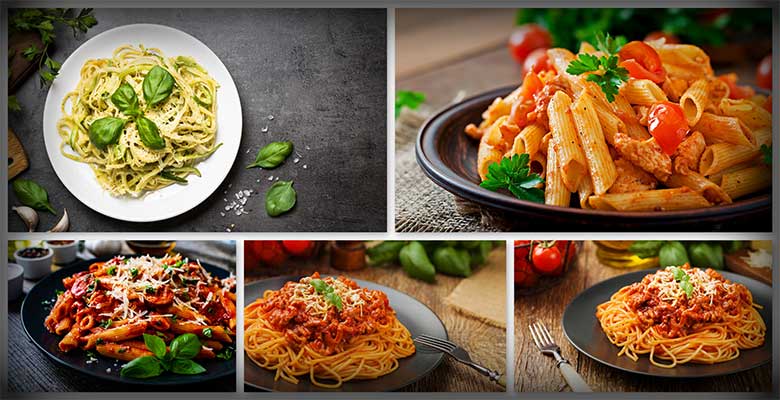
Pasta Nutrition Facts
When you are trying to lose weight, you should take everything about your diet pattern seriously. And, since you’re asking that, ‘is spaghetti fattening?’ there’s no doubt that you’re taking things seriously. Chances are you are a pasta lover like me but, are you aware of pasta nutrition facts? No? Well, that’s completely okay!
Here, we have talked about the nuts and bolts of pasta- the nutritional value, health benefits, and some tips and tricks to make your pasta-based dishes healthier. Also, there’s an FAQ section to remove any of your confusion.
So, if you are here to know every relevant information about pasta, wade through the whole article, you won’t regret it!
Is Spaghetti Fattening?
The answer is a big NO. Spaghetti or any pasta is not liable to gain weight if you maintain some stuff. Wait, we 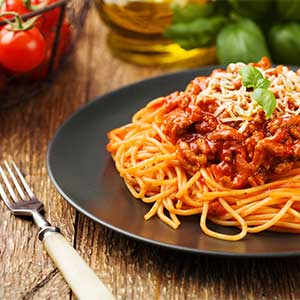 are going to explain it all.
are going to explain it all.
Pasta is rich in carbohydrates. So, first of all, you need to know how carbs affect your body. If we start with the positive effects of carbs on your health, then it’s worth mentioning that your brain requires around 130 grams of carbs in a day to function properly. So, you know how it’s important to supply carbs to your body.
But there are categories- simple carbs and complex carbs.
Simple carbs are easy and quick to break down by your body, meaning they can increase sugar levels in your blood sharply. So, yes, you can call these simple carbs BAD. Simple carbs are found in honey, sugar maple syrup, and so on.
Now, when it comes to complex carbs, you can call them GOOD carbs without a doubt. Because the molecules of complex carbs are a bit difficult to break down, so they don’t shoot up in the blood sugar rapidly. And, foods that come with whole-grains or legumes contain complex carbs.
For this, it is healthy to eat whole-grain pasta (we’ll explain this later) if you want to maintain a healthy diet plan, it’s not fattening.
Pasta Nutrition Facts
To completely know what you’re consuming is crucial. To let you know the facts, here we have laid out the nutrition facts of cooked pasta (100 grams).
- Energy: 160 kcal
- Carbs: 30 grams
- Protein: 5.8 grams
- Fat: 0.9 gram
- Vitamins such as Thiamin B1, Vitamin C, Vitamin E, etc
- Minerals such as Iron, Zinc, etc
As you can see here, 100 grams of cooked pasta contain only 0.9 gram of fat which means pasta is not your enemy if you’re on a mission of losing weight. The deeper you go in this article, the more you’ll realize it. Let’s get to know more surprising facts about pasta.
Eating Pasta Even Helps with Weight Loss
Well, do not frown after reading the heading (chuckle!) because it’s a fact, a proven fact that eating pasta even helps with weight loss. How can it be? Okay, let me explain.
It can be possible only when you’ll follow a low glycemic index (GI) diet. What it means, it’s not only about eating pasta but also following the low GI diet.
What Does Glycemic Index Mean?
GI or glycemic index refers to how quickly a carbohydrate spikes in blood sugar. Based on this principle, GI ranks the foods with carbs from 0-100. So, what it means is, the higher the glycemic index, the quicker the glucose 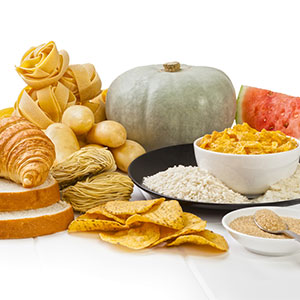 concentration will be in your blood.
concentration will be in your blood.
Now, foods are categorized into 3 different ranks where less than 55 GI means low, 55-70 GI means medium, and more than 70 GI means high glycemic index.
And. The good news is, pasta has a low glycemic index, so there’s no risk of sugar rising in the blood so quickly. So, if you eat foods from the lower GI list, you can maintain an ideal dietary pattern.
Moreover, people with diabetes need to regulate their blood sugar and appetite. So, along with the people who are obese and overweight, diabetes patients also should take the foods having lower GI.
However, all these words ended up being a fact because researchers went through 30 trials with 2,500 people. The test was like- those people ate pasta rather than eating other carbs as a part of a low GI diet.
And the result came up like this- people who ate about 1 ½ cups of pasta a week, ended up losing weight.
So, now, after knowing the facts, we can say confidently that pasta doesn’t affect your body adversely if you take it as a part of a healthy diet plan.
How Often Should You Eat Pasta?
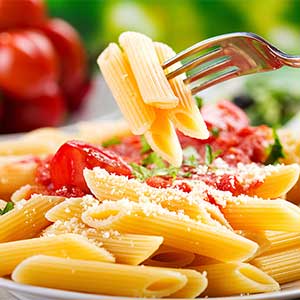 Nothing excessive is good. It’s okay that you love pasta more than anything else but you need to eat this in moderation. Experts say that eating pasta 3 times a week doesn’t lead you to gain extra pounds.
Nothing excessive is good. It’s okay that you love pasta more than anything else but you need to eat this in moderation. Experts say that eating pasta 3 times a week doesn’t lead you to gain extra pounds.
Even if you follow a low GI diet plan that we talked about before, you can lose a modest amount of weight instead. Because foods that come with a low glycemic index are considered ‘good carbs’.
So, if you’re determined to eat pasta in moderation, not taking the mountains of carbs every day in a week, it’s going to be okay.
Whole-Grain Pasta vs. Refined Pasta
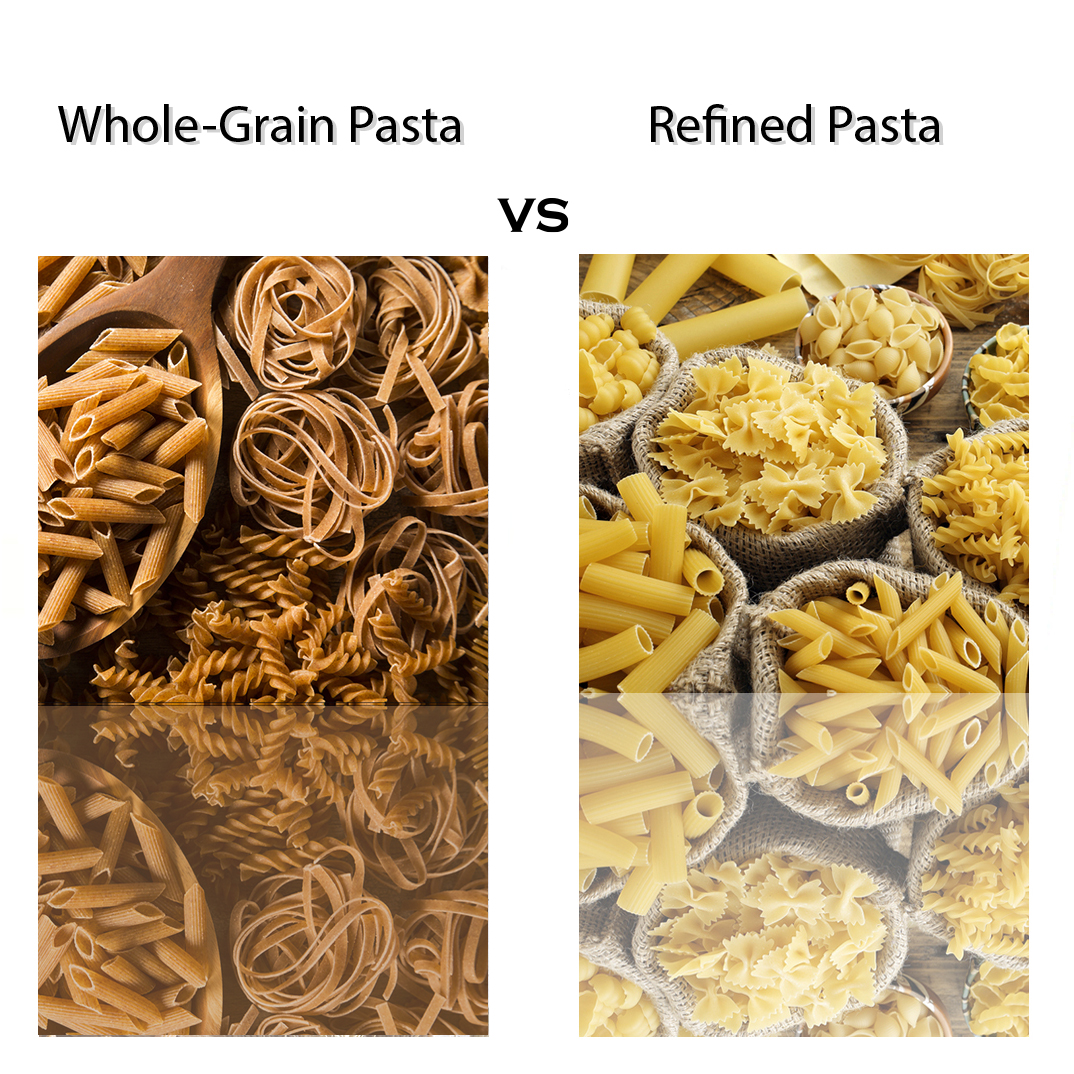 Whole-wheat and refined pasta are questionable as to which one is healthier. And, the claim is, whole-grain pasta is healthier than regular refined or white pasta.
Whole-wheat and refined pasta are questionable as to which one is healthier. And, the claim is, whole-grain pasta is healthier than regular refined or white pasta.
Because whole-grain pasta is rich in a lot of nutrients like complex carbs, fiber, protein, magnesium, zinc, and iron. On the contrary, refined pasta loses various nutrients during the refining process and it’s only high in iron and B vitamins.
If you’re not satisfied with the claim, then here you go with the evidence.
Nutrition facts of one cup of whole-grain spaghetti (cooked):
- Calories: 174
- Carbohydrates: 37 grams
- Protein: 7.5 grams
- Fat: 0.8 grams
- Fiber: 6 grams
- Vitamins such as Thiamin B1, Folate B9, etc
- Minerals like Iron, Magnesium, etc
Nutrition facts of one cup of refined spaghetti (cooked):
- Calories: 220 grams
- Carbohydrates: 43 grams
- Protein: 8.1 grams
- Fat: 1.3 grams
- Fiber: 2.5 grams
- Vitamins (e.g Thiamin B1, Folate B9, etc)
- Minerals (e.g Iron, Magnesium, etc)
We shared this information because it’s a key part of pasta and you need to have a clear idea before you decide to choose pasta as a regular dish in your diet. Refined pasta can raise the level of sugar in the blood, even it causes an increase in insulin levels as well. So, choose wisely.
Pro Tips to Eat Pasta Without Gaining Weight
Since your question is, ‘is spaghetti/pasta fattening?’ you must be a health-conscious person and we really appreciate it.
Here are some pro tips to help you with a healthy diet plan, you can eat pasta without gaining weight if you take these tips into account.
Pair Your Pasta with a Side Salad
Pair your pasta with a side salad, you won’t regret it. Take some carrots or cucumbers as a side salad and it will keep away the after-meal hunger. Also, by taking something as a salad, you will consume fewer calories.
Add Veggies to Your Pasta Dish
It’s also a good idea to add some veggies to your pasta dish. Even adding fresh vegetables to your pasta is the healthiest option. You can add zucchini, sweet potato, or cucumber to the noodles and enjoy a healthy meal.
Swap from Refined Pasta to The Whole-Grain Ones
We have explained it all at the beginning of our discussion. However, to recall the facts- refined pasta is almost empty of protein and fiber (the most vital nutrients for weight loss).
If you want something more belly-filling protein in your dish, you can go for bean-based pastas. Pastas made from black beans, lentils, or chickpeas contain more protein and fiber. More specifically, bean pasta that comes with chickpeas instead of wheat contains 4 times the fiber and twice the protein of regular pasta.
Also, some additional tips for you:
- Add lean proteins such as fish to your pasta
- Use home-made sauce instead of buying the pre-made ones
- Use only 1 to 2 tablespoons of oil in your cooking
- Avoid using cheese and try nutritional yeast
These will surely help you have a healthier pasta-based meal.
Health Benefits of Pasta
After having such a long discussion, here’s something smoother for you. Let’s get to know about the health benefits you can get from pasta.
Sustained Energy
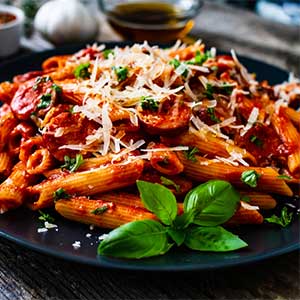 Pasta contains beneficial carbohydrates such as glucose that’s crucial for your muscles and brain. One cup of whole-grain spaghetti supplies 37 grams of carbohydrates. And, you’re probably aware that carbs are the main energy booster of your body.
Pasta contains beneficial carbohydrates such as glucose that’s crucial for your muscles and brain. One cup of whole-grain spaghetti supplies 37 grams of carbohydrates. And, you’re probably aware that carbs are the main energy booster of your body.
The complex carbs of pasta supplies energy to your body at a slow but sustained level. It’s definitely better than getting energy spikes from the simple sugars.
Also, fiber in your pasta helps to fight several chronic diseases including type-2 diabetes and obesity.
Manganese and Selenium
Both whole-wheat and refined pastas are great sources of selenium and manganese. Selenium activates some antioxidant enzymes that protect your cells from any kind of molecular damages.
And, manganese helps you to regulate blood sugar as well as metabolize carbs.
Zero Cholesterol
Are you keeping an eye on your cholesterol level nowadays? If you are, then pasta can be your cup of tea. Pasta is not only cholesterol-free but also low in sodium. Moreover, it is rich in other essential nutrients like B-vitamins and Iron.
Carotenoids and Folate
Eat whole wheat pasta if you’re wanting carotenoids or go for white pasta if you want a source of folate/vitamin B-9. Folate has a great role in developing red blood cells and supporting rapid cell growth. And, carotenoids zeaxanthin and lutein are supportive to healthy vision such as reducing the risk of having lung cancer.
Frequently Asked Questions of Spaghetti
Conclusion
To sum up, the answer to this question- ‘is spaghetti fattening?’ is NO. Pasta nutrition facts indicate that you always can carry on your diet plan along with a bowl of pasta. But yes, eating pasta in a moderation is crucial.
Things that we talked about, take all these into account when you are trying to lose weight as well as sticking to pasta-based meals. The complex carbohydrates in pasta help you get sustained energy and a belly-filling meal, so you won’t feel hungry all day long as well.
So, keep the tips and tricks in your mind to take full advantage of pasta. Enjoy your meal!
Happy Fooding!




